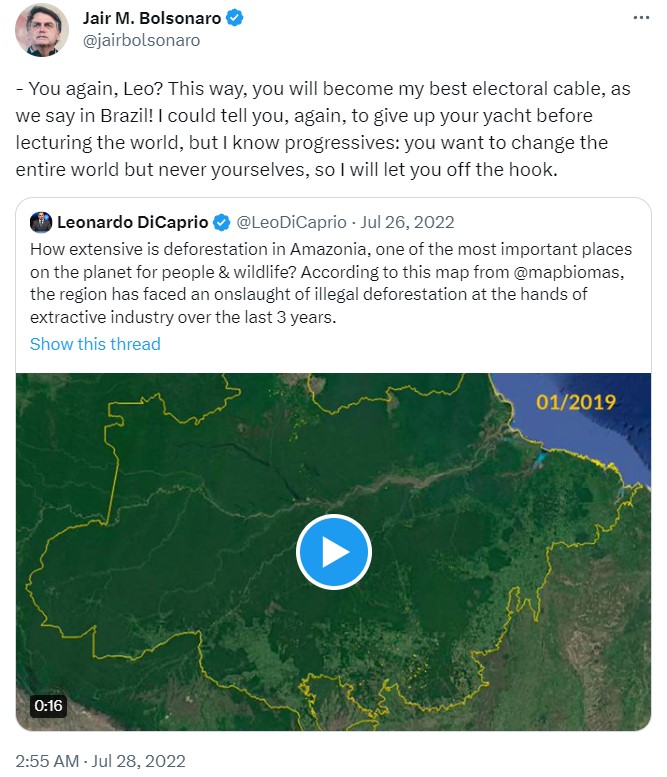The label of ‘populist’ is not useful to understand why Bolsonaro, a far-right politician, is a danger for Brazilian democracy. In this article, João Feres Júnior explains why this is the case.
Feres Júnior has been working on Bolsonaro for years, and you can find some of his most recent work here and here. In a previous article for POP, Eduardo Tamaki convincingly claimed that Bolsonaro is indeed a populist: though in apparent contradiction, the points of contact between the two approaches are numerous and that’s why it is interesting to read both articles in parallel to form a complete opinion.
One of the most interesting parts of Feres Júnior’s arguments is that beyond his populist traits and discourse, to really understand Bolsonaro’s ideology we must analyse his daily communicative guerrilla against the traditional press. The Bolsonarista communicational sphere is formed by traditional media, digital media, and the communication networks of evangelical churches and reactionary Catholicism.
Enjoy the read…
What do we gain by labeling Jair Bolsonaro a typical populist politician? Indeed, the former Brazilian president has been labeled a populist by scholars and journalists ever since he emerged on the national public scene. However, as I intend to show in this article, there are serious reasons to doubt the utility of such a label.
There are two types of problems related to labeling Bolsonaro a typical populist: those related to theoretical deficiencies associated with the concept of populism itself, and those related to the application of the concept of populism to Bolsonaro’s case. When dealing with social and political concepts, it is necessary to distinguish their definition from their application. To cite a historical example, in the famous Valladolid debate of 1550-1551, both the Thomist Bartolomé de Las Casas and the Aristotelian Juan Ginés de Sepúlveda accepted Aristotle’s theory of natural slavery, but disagreed regarding its application: while Sepúlveda saw in the natives of the New World the natural slaves defined by the Greek philosopher, Las Casas argued that, having laws and an organized collective life, this concept did not apply to them.
The concept of populism does not have a very stable formulation. Instead, it is so controversial and heterogeneous that it has become almost obligatory for all authors working with it to declare its problematic nature at the beginning of their texts in the fashion of a disclaimer. Even the most renowned authors of the literature on populism do not fail to comply with this ritual: Taggart, Laclau, Canovan, Mudde, Kaltwasser, among others.

These authors’ operational definitions, however, share common tenets, among which I will name three that seem most central. Two of them are of substantive semantic nature: (1) the concept or image of people is central to populist discourse, as is (2) the opposition between people vs. elite. The third element is, so to speak, of structural character and pertains to the semantic content of the concepts mobilized by populist politicians, particularly those of people and elite: they are empty or floating signifiers. According to the mainstream literature, this structural characteristic relates to the fact that these concepts carry varying meanings, often employed in a strategic or even opportunistic manner by the populist politician.
As enticing as this idea may seem, it appears to suffer from an epistemological deficiency at its root. As an import from structural linguistics, such a thesis treats language as if it were a collection of examples over which the linguist deliberates to conclude that, indeed, meanings vary from use-case to use-case and thus “float.” Yet, this should not be the modus operandi of the historian or social scientist, as these scholars are interested in understanding the meaning of a concept in each context of use, not merely that it can vary from situation to situation. Understanding language as action presupposes focusing on the intelligibility of human communication. It makes no sense to suppose that the populist politician communicates through unintelligible words and phrases. On the contrary, their followers seem to fully comprehend the meaning of the communication, at least enough to motivate them to act.
This epistemological amendment does not alter the substantive tenets. For instance, for Laclau, the content of populist discourse is not predetermined, as it depends on the concrete demands of the population that are not yet politicized. This interpretation is entirely coherent with the conclusion that it is possible for us, as social scientists, to identify what these demands are in each case, i.e., what issues become politicized by populist discourse.
If the first objection presented was of a theoretical, conceptual nature, the second concerns the order of application. Therefore, I do not intend to theoretically invalidate the tenets regarding the centrality of the people or of the opposition between the people and the elite in populist discourse, but rather to show that they do not apply perfectly to the case of Bolsonaro. In a recent article, I attempted to demonstrate, by analyzing Bolsonaro’s campaign material in 2018 and his social media posts during the first six months of his government in 2019, that the concept of the people did not have any centrality in his discourse (Feres Júnior & Gagliardi, 2021), but rather the concept of corruption. In other words, I did not find an abundant use of the concept with varying meanings, but rather its almost absence, something not addressed by the literature.

The most abundant and central concept in Bolsonaro’s discourse in 2018 was corruption. Although not as important as the people, corruption is often identified by various authors in the literature as a relevant concept in populist discourse . For example, according to Mudde and Rovira Kaltwasser, populism is a thin-layered ideology that pits “a homogeneous virtuous people against a corrupt or self-interested elite”.
We have already seen that the part about the people does not fit well in the Brazilian case, but what about the part about the corrupt elite? In fact, Bolsonaro’s discourse did focus on the corruption of elected politicians (an elite in the classical sense of the term) while presenting himself as the outsider who came to regenerate politics, banishing corruption from the government – a discourse he maintained until his last day in office. Bolsonarism indeed operates according to a Schmittian “friend vs. enemy” logic of politicization, something it has in common with Laclau’s theory of populism. However, its declared biggest enemy is the Workers’ Party, its politicians, and its maximum leader, Lula.
By far the most popular party in Brazil, known for defending the interests of the poorest and the working class, the Workers’ Party does not fit well into the role of an elite. Several of its politicians, including Lula, come from a popular background. Ironically, due to his social policies Lula himself was labeled as a populist by several pundits aligned with the interests of the financial system, which is massively in support of Bolsonaro. In reality, the enemy construed by Bolsonarism is formed by all individuals who embrace liberal values of the left, such as gender tolerance, racial inclusion, respect for indigenous peoples’ rights, respect for human rights. The corrupt elite, in Bolsonaro’s discourse, is not necessarily opposed to the people.
In summary, Bolsonaro exhibits several characteristics commonly associated by the literature with populist politicians – anti-establishment, antidemocratic, illiberal, coarse, and polarizing – while his discourse violates basic tenets of the concept of populism, such as the centrality of the people and the construction of an opposition between the people and the elite.
Perhaps a more productive exercise than trying to fit Bolsonaro into a predetermined model would be to define him for what he is. The Brazilian institutional politics has been dominated for 30 years by basically two groups: the center-left, represented by the Workers’ Party and its allies, and the right, represented by the Brazilian Social Democracy Party (PSDB) and its allies. The Workers’ Party remains more or less in the same ideological position it was when Lula assumed his first term in 2002: a party of working-class left leanings that moved toward the center-left in order to gain greater governability. The PSDB, which was originally a center-left party, was pushed to the right by the Workers’ Party. At any rate, the “traditional” Brazilian right was primarily focused on economic issues, advocating for a small state, but reasonably liberal in terms of values.

Bolsonaro was the first far-right politician to achieve electoral success at the national level. This label stems from two factors: (1) for the first time in the country’s recent history, a relevant political force combines economic and cultural conservatism, and (2) he governed by constantly threatening the democratic institutions, such as federal control agencies, the Supreme Federal Court, the electoral system, but also journalists and members of the opposition.
Bolsonaro’s conservative value discourse is not particularly tied to a strong idea of national identity. Bolsonaro rather focuses on militarism and the reactionary principles of right-wing evangelical and Catholic groups. The ultraconservative Christian advocacy of the patriarchal family and of heteronormativity are strong flags in the cultural fight against the left. Meanwhile, from many Bolsonaristas the love for the military propagates through the fiction that they are a masculine, disciplined, and incorruptible organization, i.e., the opposite of the apparent chaos of democratic politics.
There is another key characteristic of Bolsonarism that escapes most theories of populism for the simple reason that they are excessively focused on discourse. As shown by the nation-wide qualitative survey we conducted in 2021 exclusively with Bolsonaro voters, Bolsonarism is a communicational sphere: a set of communication channels that feed followers with Bolsonaro’s own versions of facts and narratives, in a daily guerrilla against the traditional press. The Bolsonarista communicational sphere is formed by traditional media – TV channels Record, SBT, Rede TV, CNN-Brazil, Jovem Pan and a large number of regional channels, AM and FM radio stations –; weakly centralized digital media around the so-called “Cabinet of Hate” – profiles and pages on Facebook, Instagram, YouTube, WhatsApp and Telegram groups, etc –; and the communication networks of evangelical churches and reactionary Catholicism.
I have tried to show above the main problems involved in labeling Bolsonaro a populist and, also, an alternative diagnosis that is, not only theoretically more adapted to the specificity the case, but also more useful for those dedicated to combating the threat Bolsonarism poses to Brazilian democracy.

João Feres Jr. holds a master’s degree in philosophy from the State University of Campinas (1997), and a master’s and a PhD in Political Science from the City University of New York. He is a full professor of political science at IESP-UERJ and coordinates the LEMEP – Laboratory for Media and Public Space Studies, and the Multidisciplinary Study Group on Affirmative Action (GEMAA). Feres Jr. is currently working on the following topics: media and politics, political behavior, political theory and conceptual history theory, affirmative action policies, and racial relations.

